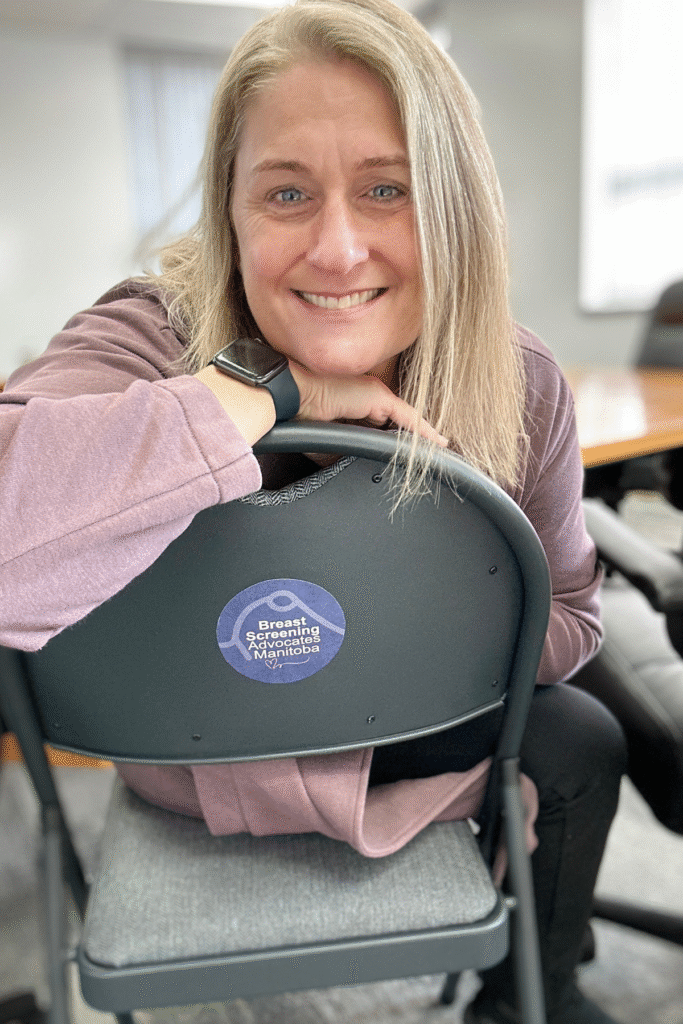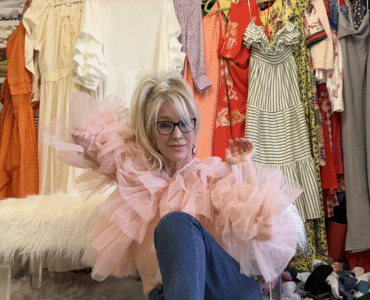Guest post by Jenni Borgfjord
I didn’t plan to become a breast health advocate or a champion for breast cancer screening. I don’t have a health degree or a social media following. What I did have was a normal mammogram result in April 2023, and a breast lump one month later.
That lump turned out to be breast cancer. A moderately aggressive kind. One that slipped through two breast cancer screening mammograms. After melting into nothing short of a puddle for several months post-diagnosis, I realized that something wasn’t working, not just in my body, but in the healthcare system.
From “I’m going to die” to “I’m going to advocate for breast screening”
In the early days of my diagnosis, I was wholly focused on feeding my anxiety monster. I was woefully undereducated about everything to do with breast cancer and breast cancer screening. I didn’t think it was possible for me because I had no family history. Wrong! Once I heard the words, “Unfortunately, you have breast cancer,” I immediately thought I was going to die…of breast cancer…and my demise would happen soon.
But slowly, over time, after many early morning and late-night Google searches, I started to educate myself. I used credible sites like the Canadian Cancer Society and the Mayo Clinic. I AskedEllyn. I learned about dense breasts and how mammograms aren’t enough for many of us who have dense breasts. I read stories of women who have similar stories to mine. I followed doctors, including radiologists and oncologists, on social media. I learned about the need for and now pending reform to the Canadian Task Force on Preventive Care. This task force issued outdated and potentially harmful guidelines surrounding screening to our already overburdened family doctors for a wide range of diseases and conditions, including breast cancer screening.
The information I read stunned me, and I can’t unlearn it. I see surprise, maybe shock, in the eyes of many folks, including those of a mammogram technician, when I tell them: “I had a normal mammogram in March 2023. I found a cancerous lump myself one month later.”
I was not alone in not knowing about breast cancer screening and dense breasts
As I learned more and more about breast cancer, breast cancer screening and the significant advancements that have been made in recent decades, my anxiety and fear lessened, and my thoughts turned to education. When I started to talk about my experience with folks who did not have breast cancer, I learned that not many of them knew much about breast cancer either, especially about the risk factors and dense breasts in particular.
I want people to know. The educator in me cannot let this go. Education is a powerful antidote to anxiety.
That’s when my advocacy for breast cancer screening started, like a freight train gathering steam. I talked to friends. I surfed the Internet. My cookies led me to Dense Breasts Canada’s Facebook account and then their website. I contacted Jennie from Dense Breasts Canada (DBC). I wrote to my Member of the Legislative Assembly (MLA) and met with them in person to share my experience with breast cancer screening. I wrote out an account of my story and shared it with DBC. I wrote three submissions to two standing committees in the Canadian House of Commons. I shared information about the risks of dense breasts and my story in the Manitoba legislature building at Manitoba’s first-ever All-Party Cancer Caucus, hosted by the Canadian Cancer Survivor Network. The provincial health critic and my MLA were there to support me. I briefly met the provincial Health Minister. I write many emails and letters. I make and share hundreds of social media posts. I tag and comment on social media accounts that are the stakeholders and educators of breast screening. I became certified as a breast health educator with Know Your Lemons.
“If they don’t give you a seat at the table, bring a folding chair.” – Shirley Chisholm
What advocacy around breast cancer screening looks like now for me is constantly evolving. It’s about finding survivors or allies who will champion this cause. It’s listening to stories that echo mine—and those that are even more heartbreaking and eye-popping. It’s about writing blogs for AskEllyn. I hope to provide patients and allies a voice to raise concerns that are often brushed aside, so that we can have optimal breast cancer screening and surveillance in place everywhere. I want the next generation — our daughters — to have optimal care. I am not a healthcare provider. I am, however, an educator with nearly 30 years of experience and some technology know-how.
Advocacy can be loud, quiet and creative
Sometimes the advocacy is loud. I helped create and lead a grassroots group called Breast Screening Advocates Manitoba. We created a website and social media accounts. We’re advocating for modernized breast cancer screening and surveillance guidelines. We are sharing our learning about dense breasts and other risk factors. We’re telling our stories, writing, tagging, and commenting.
Sometimes, advocacy is quiet. It might be replying to a message from someone who just found a lump and doesn’t know what to do next. It is about slipping a Know Your Lemons 12 Signs business card into someone’s hand or displaying them on a table during a community event.
Advocacy is also creative. I hosted a “Spin & Learn” class to share breast health information before, during and after the spin class ride. With the help of volunteers, I created lumpy keychains and a cute poem to give away to participants of two Know Your Lemons sessions as a reminder to perform breast self-exams and engage in breast cancer screening. I compiled a display table to attend a farmer’s market and a bra fashion show. I participated in a virtual golf tournament to raise awareness about breast cancer in young women.
Advocacy doesn’t mean I’m fearless. It doesn’t mean I always say or do the right thing. And it doesn’t mean I’ve figured out how to balance everything. Some days, I need to step back. Some days it feels utterly soul-sucking. But then, someone says, “Because of your story, I booked a mammogram.” Or “I didn’t know dense breasts were a thing, now I do.” That’s when I remember my why I have begun advocating for breast cancer screening and the bounce in my step returns. When advocacy hurts, I turn to education.
If you’re wondering if you’re qualified, to be a breast cancer screening advocate, you are. I am. If you’re wondering where to start, begin with small steps, rest when you need, and keep going. I did. Patient and ally voices matter. Your stories make a difference and will save lives. And if you are not offered a seat at the table, bring a folding chair.
Education and Advocacy Links
Breast Screening Advocates Manitoba Links
Advocate for yourself and others
Canadian Cancer Survivor Network
About the author

Jenny Borgfjord is a mom of three grown kids, plus one daughter-in-law and life partner to Mark. She’s spent her teaching career championing accessibility and striving for innovation in education. After being diagnosed with breast cancer that was missed on at least one “normal” mammogram due to dense breast tissue, Jenny became a passionate advocate for breast health education and the need for modernized screening practices. She encourages everyone to take any breast change lasting more than two weeks seriously, even after recent “normal” results, and to learn about breast density and other individual risk factors. Jenny volunteers with Dense Breasts Canada, Know Your Lemons, and Breast Screening Advocates Manitoba to raise awareness and push for optimal screening guidelines in Manitoba and across Canada. She believes in sharing what she’s learned and making conversations about breast health less awkward and more routine. Jenny is determined to leave no breasts behind.
Follow me on YouTube!




